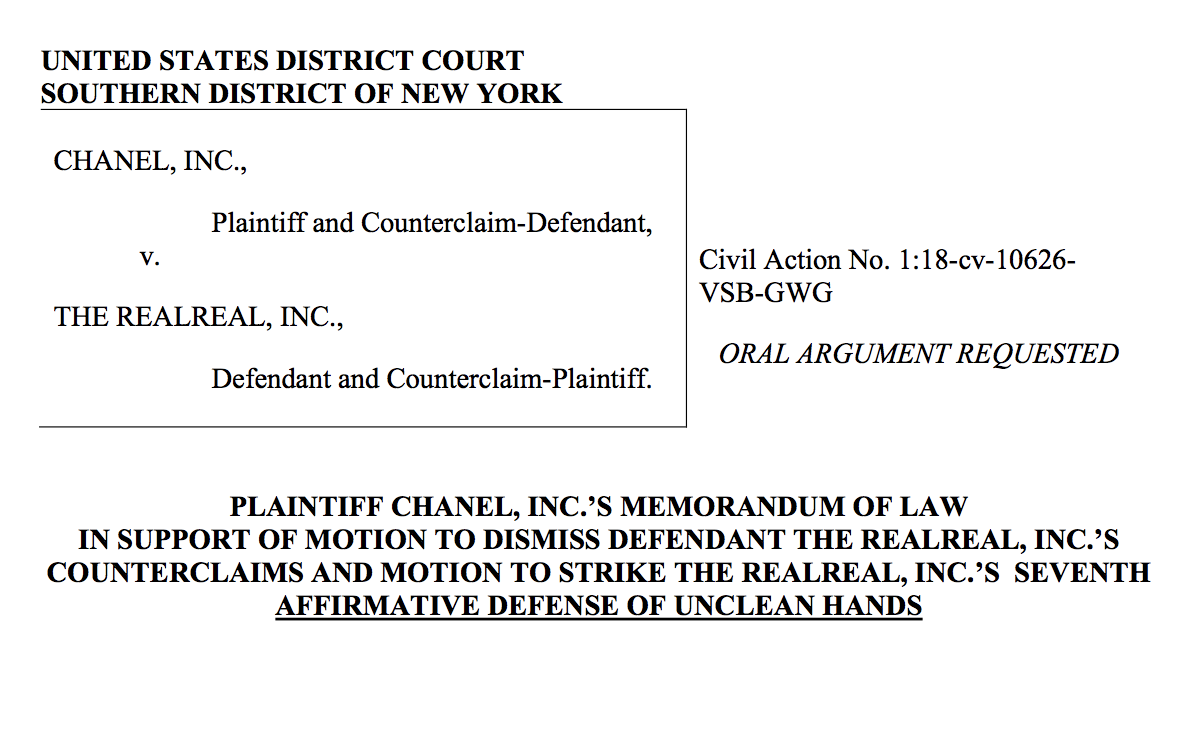The Legal Saga Continues: Chanel Moves To Dismiss The RealReal's Antitrust Claim
Earlier this month, I reported that The Real Real ("TRR") added as a counterclaim a new allegation that Chanel is using its monopoly power to unlawfully exert dominance in the resale market and to tortiously interfere with TRR's contractual relationships. Now, Chanel moves to dismiss the claim, calling it "unrelated in time or nexus to the Chanel's original claims." For those who may have forgotten the origin of this lawsuit, it started back in 2018 as Chanel raised claims of trademark infringement, counterfeiting and false advertising against TRR. Chanel forcefully states in its motion to dismiss the counterclaim that TRR's allegations are entirely conclusory and thus unmeritorious as a matter of law. Let's discuss in detail the legal position Chanel is taking with respect to the antitrust claim.
Chanel claims that it can't be the case that Chanel exercises monopoly power in the resale market. In fact, Chanel points out that even TRR's initial complaint acknowledged that it is not when TRR observed earlier that "the market is dominated by 3 different companies". Referenced as "The Holy Trinity", the moniker, which is tinged with an aura of invincibility, refers to Chanel, Louis Vuitton and Hermès. Chanel raises a punchy rhetorical point. How can Chanel be a monopolistic power when the market has three dominant players locked in competition with one another? Furthermore, Chanel indicates that TRR defined the relevant market too narrowly - "1) hold-value handbags that sell for over $2,000 and retain a resale value of 50% to 100% of the initial sale value and 2) investment grade handbags" - so as to render Chanel seemingly singularly monopolistic. Chanel's motion then makes out a case that such "gerrymandering" of the relevant market belies true market realities where there are multiple players that are actively competing against each other. Taken as a whole, Chanel is arguing that, based on TRR's own initial factual allegations, Chanel can't be defined as a monopolist for the purpose of imposing antitrust liability.
Chanel is going one step further. Chanel calls the court's attention to the fact that TRR is unable to make a convincing case for attempted monopoly. That is, it cannot sufficiently demonstrate that Chanel acted with "specific intent to monopolize" and has a "dangerous probability" of achieving monopoly. Absent plausible factual allegations that go into proving the two elements, TRR cannot hold Chanel liable under Section 2 of the Sherman Act as a matter of law. See 15 U.S.C. §2. Again, Chanel accentuates the high level of market competition for it "faces extensive, durable, and dynamic competition", which is wholly contrary to the false specter of monopoly TRR has been attempting to create. The presiding judge will soon decide whether TRR's counterclaim should be thrown out of court. I personally think that Chanel's strategy in writing this motion is really clever. Calling your opponent out for its own contradictions does have forces of persuasion. I will periodically report on this case as it progresses. It seems, at least for now, no amicable resolution is in near sight.











Comments
Post a Comment